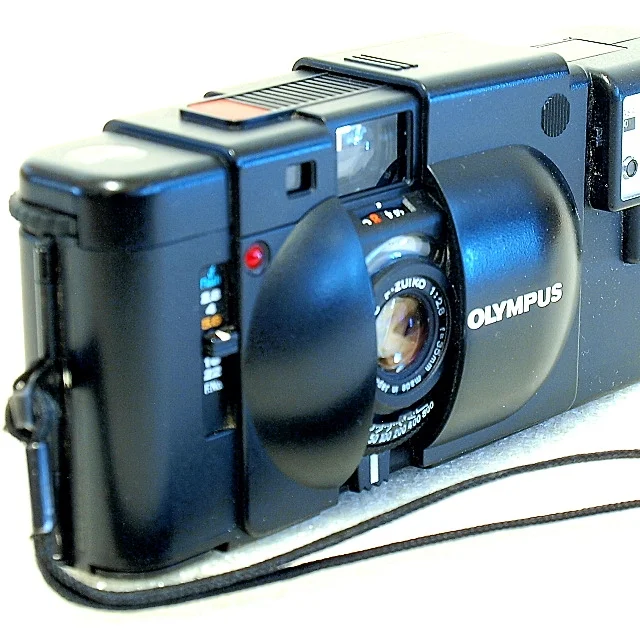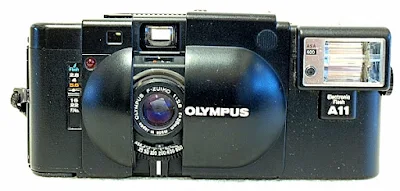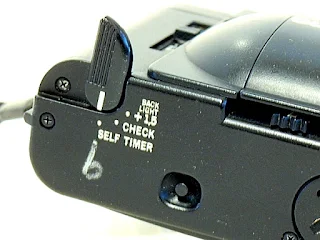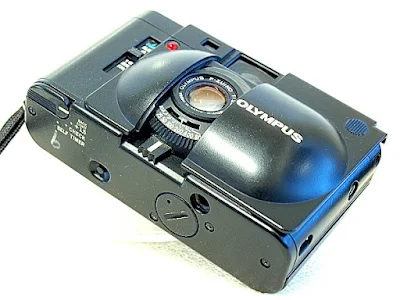Olympus launched the XA Capsule Camera series in 1979 with the introduction of the Olympus XA. Designed by Yoshihisa Maitani, chief camera designer and managing director of Olympus Optical Co Ltd., the camera series was one of the smallest 35mm film cameras ever made.
The Olympus XA, sold from 1979 to 1985, was the original model in the series. It is an Aperture-Priority AE camera, a true rangefinder, comes with a fast 35mm f/2.8 lens, a delayed shutter speed of up to 10 seconds, and is the only model in the series with these quadruple features.
Later models, from the XA2 to XA4, were pure viewfinder cameras with scale focusing, while the XA1 comes with a fixed focus lens. Though the model range resembled each other, there were subtle differences in their design. The XA3 and XA4 were slightly larger than the XA and XA2. The original XA's dust cover dome resembled a flattened oval, whereas the other models had a more rounded design.
Olympus XA (experience & review)
MORE INFO HERE*** Fran filmed this episode. Subscribe to her! https://www.youtube.com/user/frannerd13 Music by Rodrigo Recabarren http://www.rodrigorecabarren.com/ my friend George is the owner of this Olympus XA. Check his stuff here: http://www.ourcity.london/ AND NOW, SOME TECHNICAL DETAILS All my videos are recorded with a Canon EOS M. Nothing fancy. FOLLOW ME, FOX!
Design and Built
The Olympus XA is a 35mm Aperture-Priority AE rangefinder camera fitted with an electronic between-the-lens shutter capable of an automatic shutter speed ranging from 10 seconds to 1/500 seconds. The lens is 6 elements in 5 groups F. Zuiko 35mm f/2.8 with an aperture range from f/2.8 to f/22. The film ISO speed is from 25 to 800, and the backlight compensation is at +1.5EV.Unique to this series, except for the XA1, is the shutter release which is by a touch-sensitive electro membrane pad, and the camera was designed as an all-in-one capsule with a sliding dust cover, which slides back to open the lens and set the camera operation on.
The camera comes with a bright frame finder integrated with a double-image coupled rangefinder effective from 0.85 meters to infinity. The shutter release is electromagnetic feather touch, and a 12-second self-timer delay is activated by a lever. The camera's body weight is 225 grams.
Basic Camera Features
The front of the camera is excitingly plain with the capsule closed, with only the self-timer/battery check LED, and the aperture scale slide. With the dust cover slid back, we see the viewfinder and the rangefinder parallax window on the top plate area of the camera, located just above the distance scale window orientated upward to where you can see it by just leaning the camera slightly backward.The rest of the dust cover opening is occupied by the lens and its mount, above which is the CDS light sensor, the film ISO selector lever below the front lens element, and the conveniently oversized rangefinder focusing lever which is even reachable with the dust cover closed.
On the top plate of the XA is the film rewind knob which is also the film-back pull-up release lever on the left, which is covered by part of the dust cover when the camera is in operation, the 'red' feather touchpad of the electromagnetic shutter release, and the frame counter window to the right.
The back of the XA is plain with the fixed hinge type film back not having any adornment or functional items, the viewfinder window is only exposed when the dust cover is opened, and the thumb-wheel fil wind on the top right corner of the back.
The bottom plate is occupied by the battery chamber cover, tripod socket, film rewind release, and a multi-use lever for the +1.5EV exposure compensation, battery check, and self-timer functions.
Film loading is standard easy load with the film chamber, shutter frame, forward sprocket, a multislot take-up spool, and the standard two blank shots to load the film to frame 1.
Dedicated Flash Units
Control is through a couple of X-synchro contacts. This seems to be the only quirk of the system where none of the XA series cameras comes with a hot shoe. The flash unit range includes the A9M, A1L, A11, and A16.
Viewfinder Readout
The shutter speed is adjusted by varying the aperture opening on the lens. For action shots, for example, where you want a higher shutter speed to stop the action, adjust the aperture to a wider opening. For speeds lower than the camera shake threshold, or for long exposure automatic shots, place the camera on a solid surface or a tripod.
The F.Zuiko 35mm f/2.8
The lens is the center of the cult obsession, with the XA, and as you might say, with other Olympus compacts fitted with the same lens, the Olympus MJU-II. The lens is as sharp as anyone could ever need. Both of these cameras are drawing high price bids when offered on auction sites.
Zone Focus Setting
Ensure that your subjects are about that distance from the lens and shoot away. Use the exposure compensation lever to adjust for capturing dark objects against a bright background.
The Self-Timer Lever
At its extended position, the self-timer lever acts as a body extension and adds to the stability of the camera. Try doing a couple of low-light shots using this technique, and you will be delighted with the resulting images.
Battery
The XA is designed to work with a pair of silver oxide SR44 or alkaline LR44 button cells which is ever available on the market. The SR44s may last a while longer but best to change the LR44 every six months or so.Compared to silver oxide SR44s, alkaline LR44s cells have a non-flat discharge curve and this may lead to lowered exposure readings for batteries that have been placed in the camera for an extended period.
Using The Camera
Flash and long exposure trailing lights can be achieved by first setting the flash unit on, then by moving the aperture slider away from the flash setting to a smaller aperture and taking the shot. This technique will fire the flash but the camera will keep the shutter open for a long exposure shot, letting you integrate streaming background lights into your image. When set to flash mode alone, the camera will fire at a fixed speed of 1/60 second.


























No comments:
Post a Comment